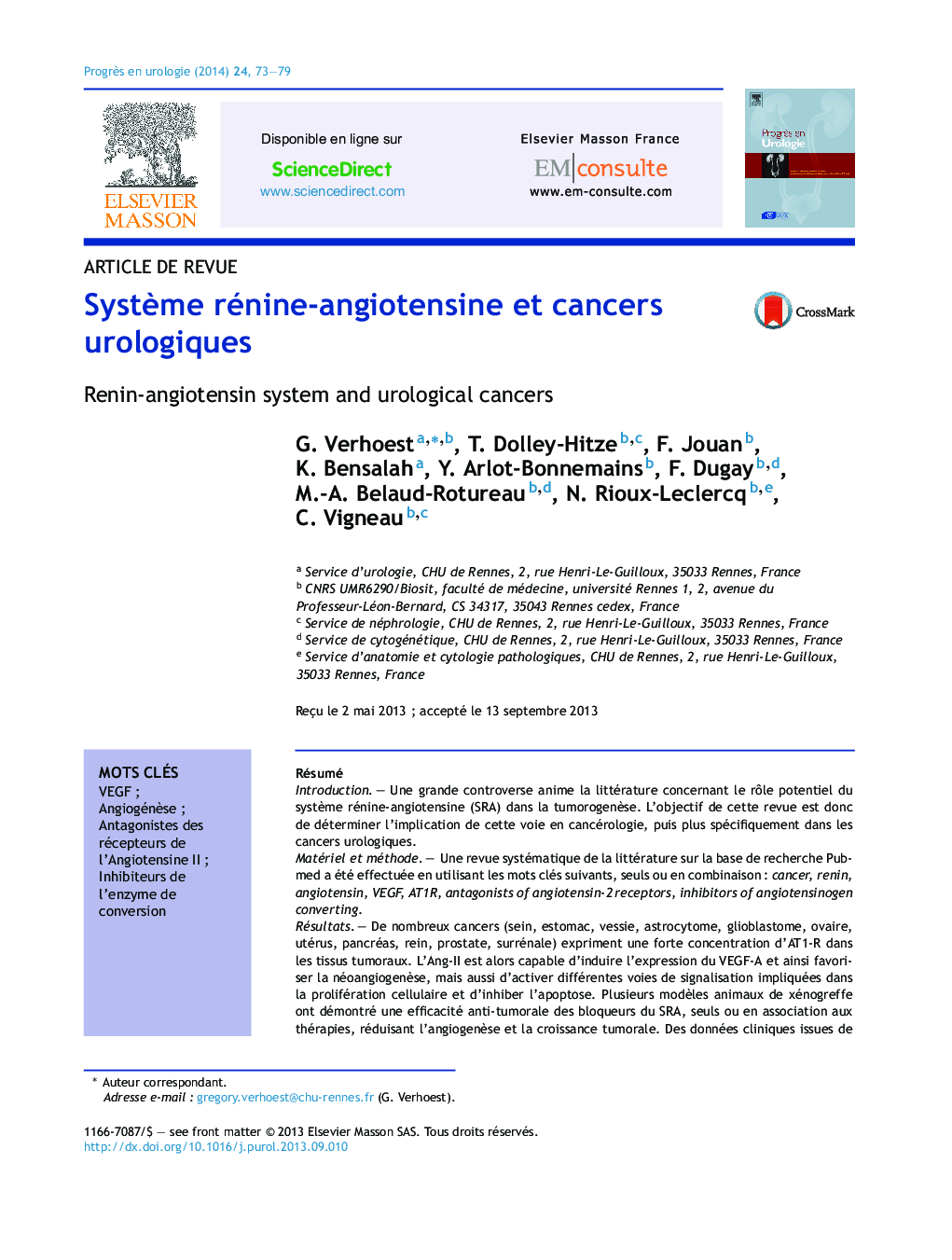| کد مقاله | کد نشریه | سال انتشار | مقاله انگلیسی | نسخه تمام متن |
|---|---|---|---|---|
| 3824225 | 1246750 | 2014 | 7 صفحه PDF | دانلود رایگان |

RésuméIntroductionUne grande controverse anime la littérature concernant le rôle potentiel du système rénine-angiotensine (SRA) dans la tumorogenèse. L’objectif de cette revue est donc de déterminer l’implication de cette voie en cancérologie, puis plus spécifiquement dans les cancers urologiques.Matériel et méthodeUne revue systématique de la littérature sur la base de recherche Pubmed a été effectuée en utilisant les mots clés suivants, seuls ou en combinaison : cancer, renin, angiotensin, VEGF, AT1R, antagonists of angiotensin-2 receptors, inhibitors of angiotensinogen converting.RésultatsDe nombreux cancers (sein, estomac, vessie, astrocytome, glioblastome, ovaire, utérus, pancréas, rein, prostate, surrénale) expriment une forte concentration d’AT1-R dans les tissus tumoraux. L’Ang-II est alors capable d’induire l’expression du VEGF-A et ainsi favoriser la néoangiogenèse, mais aussi d’activer différentes voies de signalisation impliquées dans la prolifération cellulaire et d’inhiber l’apoptose. Plusieurs modèles animaux de xénogreffe ont démontré une efficacité anti-tumorale des bloqueurs du SRA, seuls ou en association aux thérapies, réduisant l’angiogenèse et la croissance tumorale. Des données cliniques issues de séries rétrospectives ont également mis en évidence une augmentation des taux de survie sans progression ou des taux de réponse chez des patients traités par des bloqueurs du SRA.ConclusionDe nombreuses données ont semblé démontrer l’implication de la voie rénine-angiotensine dans la carcinogenèse, ainsi qu’un effet anti-tumoral des bloqueurs du SRA, en complément des traitements anti-cancéreux. Des études cliniques sont à présent nécessaires pour confirmer ces données expérimentales.
SummaryIntroductionA controversy animates the literature on the potential role of the renin-angiotensin system (RAS) in tumorogenesis. The objective of this review was to determine the involvement of this pathway in cancer, and more specifically in urological cancers.Material and methodWe made a systematic review of articles referenced in Pubmed, using the following keywords alone or combined: cancer, renin, angiotensin, VEGF, AT1R, antagonists of angiotensin-2 receptors, inhibitors of angiotensinogen converting.ResultsMany types of cancers overexpress AT1-R in their tumoral tissues (breast, stomach, bladder, astrocytoma, glioblastoma, ovary, uterus, pancreas, kidney, prostate, adrenal gland). Ang-II can induce VEGF-A expression and promote neoangiogenesis, but also can trigger different molecular pathways involved in cell proliferation or inhibit apoptosis. Several xenograft murin models demonstrated anti-tumoral efficacy of RAS blockers, alone or using combined therapies, targeting angiogenesis and slowing down tumor growth. Retrospective studies in patients have also revealed a better progression-free survival and a better response to therapies in those treated with RAS blockers.ConclusionMany data seem to demonstrate the involvement of the RAS in carcinogenesis, as well as anti-tumoral effect of RAS blockers in addition to anti-cancer treatments. Clinical data are now expected to confirm these experimental findings.
Journal: Progrès en Urologie - Volume 24, Issue 2, February 2014, Pages 73–79